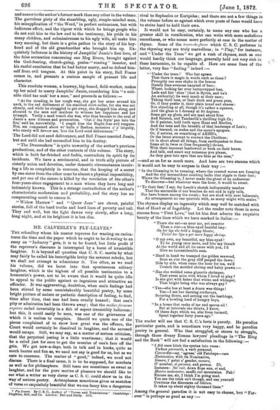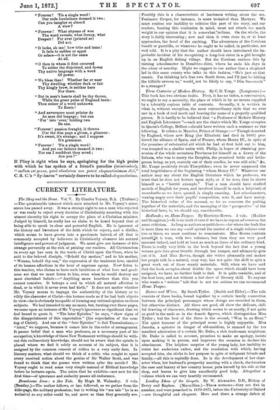MR. CALVERLEY'S FLYLEAVES.*
THE schoolboy whom his master reproves for wasting on carica- tures the time and the paper which he ought to be devoting to an essay on "Industry " gets, it is to be feared, but little profit if the reprover's discourse is interrupted by a burst of irresistible laughter. It is beyond all question that C. S. C. merits by what may fairly be called his incorrigible levity the severest rebuke, but we shall not attempt to administer it. Too often, as we read his volume, did we burst into that spontaneous solitary laughter, which is the highest of all possible testimonies to a bumourist's power, not to be aware that it would be quite idle to appeal to the public against so ingenious and attractive an offender. It was aggravating, doubtless, when one's feelings had been stirred by some unmistakeably beautiful poetry, by some bright picture of nature or pathetic description of feeling, to find, time after time, that one bad been cruelly hoaxed ; that one's pity or admiration bad been thrown away ; that the mailer formosa -superne ended invariably in a fish of aspect irresistibly ludicrous ; but this, it could easily be seen, was one of the grievances of which it is useless to complain. Should we quote one of the pieces complained of to show how great was the offence, the Court would certainly be dissolved in laughter, and the accused would escape. Still, we may say, as a matter of serious criticism, that the perpetual jesting is a little wearisome ; that it would be a relief just for once to get the muscles of one's face off the grin. We get now-a-days, both in talk and in books, quite as much banter and fun as, we need not say is good for us, but as we care to consume. The matter of "good," indeed, we need not discuss. There is a final cause, it is to be supposed, for acrobats as well as for philosophers. Still tears are sometimes as sweet as laughter, and for the pure motive of pleasure we should like to see what a writer so very clever as C. S. C. could show us in the way of serious poetry. Aristophanes sometimes gives us snatches of verse so exquisitely beautiful that we can fancy him a dangerous Fly Leases. By C. S. 0, Author of "Verses and Translations." Delghton, Bell, and Co. London: Bell and Daldy. 1872.
Cambridge :
rival to Sophocles or Euripides ; and there are not a few things in the volume before us against which even poets of fame would have to strive hard to hold their own.
It would not be easy, certainly, to name any one who has a greater skill in versification, who can write with more melodious smoothness, or who seems more perfectly at ease in the matter of rhyme. Some of the tours-de-force which C. S. C. performs in the rhyming way are truly marvellous ; in "Play," for instance, and "Under the Trees" we get a rush of rhymes, such as one would hardly think our language, generally held not very rich in these harmonies, to be capable of. Here are some lines of the latter, very fine " fooling" indeed :— " Under the trees !' Who but agrees
That there is magic in words such as these ?
Promptly one sees shake in the breeze Stately lime-avenues haunted of bees: Where, looking far over buttercupped leas, Lads and fair ' shes ' (that is Byron, and he's An authority) lie very much at their ease; Taking their teas, or their duck and green peas, Or, if they prefer it, their plain bread and cheese : Not objecting at all, though it's rather a squeeze,
And the glass is I daresay at 80 degrees.
Some get up glees, and are mad about Ries And Sainton, and Tamberlik's thrilling high Cs; Or if painter, hold forth upon Hunt and Maclise, And the tone and the breadth of that landscape of Lee's ; Or if learned, on nodes and the moon's apogees.
Or, if serious, on something of AKHB's, Or the latest attempt to convert the Chaldees ; Or in short about all things, from earthquakes to fleas.
Some sit in twos or (less frequently) threes, With their innocent lambswool or book on their knees, And talk, and enact any nonsense you please,
As they gaze into eyes that are blue as the seas,"
—and so on for as much more. And here are two stanzas which it would not be easy to surpass in their way :—
" In the Gloaming to be roaming, where the crested waves are foaming And the shy mermaidens combing locks that ripple to their feet; Where the Gloaming is, I never made the ghost of an endeavour To discover—but whatever were the hour, it would be sweet.
"'To their feet,' I say, for Leech's sketch indisputably teaches That the mermaids of our beaches do not end in ugly tails,
Nor have homes among the corals ; but are shod with neat balmorals, An arrangement no one quarrels with, as many might with scales."
The rhymes display an ingenuity which may well be matched with that of Hood or of Ingoldsby. Let the reader note those in some stanzas from "First Love," but let him first admire the exquisite beauty of the lines which we have marked in italics :— "There she sat—so near me, yet remoter Than a star—a blue-eyed bashful imp: On her lap she held a happy bloater, 'Twist her lips a yet more happy shrimp.
"0 my own, my beautiful, my blue-eyed!
To be young once more, and bite my thumb At the world and all its cares with you, I'd Give no inconsiderable sum.
"Hand in hand we tramped the golden seaweed, Soon as o'er the gray cliff peeped the dawn : Side by side, when came the hour for tea, we'd Crunch the mottled shrimp and hairy prawn :— " Has she wedded some gigantic shrimper, That sweet mite with whom I loved to play ? Is she girt with babes that whine and whimper, That bright being who was always gay ?
"Yes—she has at least a dozen wee-things! Yes—I see her darning corduroys,
Scouring floors, and setting out the teathings, For a howling herd of hungry boys, "In a home that reeks of tar and sperm-oil ! But at intervals she thinks, I know, Of these days which we, afar from turmoil, Spent together forty years ago."
The reader will see that C. S. C.'s forte is parody. He parodies particular poets, and is sometimes very happy, and he parodies poetry in general. Who that struggled, or strove to struggle, through those dreary Roman lawyers' pleadings in "The Ring and the Book" will not feel a satisfaction in the following :—
" I did once hitch the syntax into verse : Verbwn personale, a verb personal, Concordat—ay, 'agrees,' old Fatchaps—cum Non:int-aim with its Nominative, Genere, i' point o' gender, numero, 0' number, et persona, and person. Ut, Instance : Sol ntit, down flops sun, et and, Montes umbrantur, snuffs out mountains. Pah! Excuse me, air, I think I'm going mad. You see the trick on't though, and can yourself Continue the discourse ad libitum. It takes up about eighty thousand lines."
Among the general parodies it is not easy to choose, but " For- ever " is perhaps as good as any :— "Forever 'Tis a single word ! Our rude forefathers deemed it two : Can you imagine so absurd A view ?
" Forever ! What abysms of woe The word reveals, what frenzy, what Despair ! For ever (printed so) Did not.
"It looks, ah me! how trite and tame ! It fails to sadden or appal Or solace—it is not the same At all.
"0 thou to whom it first occurred
To solder the disjointed, and dower Thy native language with a word. Of power.
"We bless thee! Whether far or near Thy dwelling, whether dark or fair Thy kingly brow, is neither here Nor there.
"But in men's hearts shall be thy throne. While the great pulse of England beats : Thou coiner of a word unknown To Keats!
"And nevermore must printer do As men did 'engage; but run ' For ' into 'ever,' bidding two Be one.
"Forever ! passion-fraught, it throws O'er the dim page a gloom, a glamour : It's sweet, it's strange ; and I suppose It's grammar.
"Forever ! 'Tis a single word !
And yet our fathers deemed it two : Nor am I confident they erred ; Are you ?"
If Pliny is right when he says, apologizing for the high praise with which he has spoken of a friend's parodies (mimiambos), 44 nullum eat genus, quod absolution non potest eloquentissimum dici," C. S. C.'s " fly-leaves " certainly deserve to be called eloquentissinta.



































 Previous page
Previous page